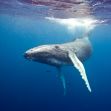Canadian seafood giant Cooke Inc. of St. John, New Brunswick, along with American company Omega Protein, Alpha VesselCo Holdings LLC, and others are facing a $2 billion lawsuit over claims that the company violated the American Fisheries Act (AFA) of 1998 and the Jones Act of 1920. Under these laws, only U.S. citizens are allowed to fish in U.S. waterways.
In addition to violating federal laws, the lawsuit alleges that the companies colluded to hide their fraudulent business dealings.
The lawsuit was filed in the United States District Court for the Southern District of New York in Manhattan by New York law firm Holwell Shuster & Goldberg LLP and represents two plaintiffs who say they are suing on behalf of the U.S. government, the Maritime Administration (MARAD) of the United States Department of Transportation, and the United States Coast Guard.
Named as plaintiffs in the complaint are W. Benson Chiles and Chris Manthey. Manthey is a professional investigator and researcher who is a co-founder of the organization Back Track Report. The organization is a private investigation firm based out of New York that specializes in pre-deal background research on business executives. Chiles works as a consultant who has previously worked with conservation groups that monitor, investigate, and report on issues pertaining to recreational and commercial fishing on U.S. waterways.
The lawsuit came to fruition after an investigation into a $500 million purchase by Cooke Inc. in 2017 of Omega Protein of Reedville, VA, and all its assets. Omega Protein owned and operated a fleet of 67 vessels, 37 of which were commercial fishing vessels, as well as a shipyard in Moss Point, Miss., and three fish processing operations. Cooke Inc. is a private Canadian firm that is owned and operated by the Cooke family.
When the purchase was made in 2017, Cooke Inc. utilized the vessels and engaged in fishing through U.S. waterways including the Atlantic Ocean, the Chesapeake Bay, and the Gulf of Mexico. In doing so, the company allegedly violated the AFA and Jones Act because of its commercial operations as a foreign entity.
The lawsuit explains, “As a result of a fraudulent scheme, defendants have illegally harvested from United States waters many millions of dollars worth of (menhaden) fish to which they are not entitled.”
The lawsuit explains that this private entity knowingly engaged in a “figurehead fraud scheme” because it acted as a shell corporation to violate the citizenship requirement of the AFA.
After purchasing Omega Protein, the company transferred ownership of the vessels to have 20% belong to Cooke Inc., and 80% belong to a U.S. citizen named Seth Dunlop. Dunlop is an employee of Cooke Inc. and the nephew of the company’s CEO Glenn Cooke.
The lawsuit goes on to say that Cooke Inc. was aware of the citizenship requirements because during sale negotiations, Cooke Inc. agreed to pay $20 million if the deal failed to close because of the inability to obtain MARAD approval over the citizenship concerns. The complaint explains, “Accordingly defendants entered into an agreement…to create a post-acquisition ownership structure for the Omega vessels… while ensuring that Cooke and Omega would retain control via a figurehead.
The lawsuit is seeking upwards of $2 billion as the AFA anti-fraud rule imposes violations including fines of up to $154,000 per vessel per day for concealing material facts or making false representations.
This lawsuit was filed under the federal False Claims Act. This type of litigation is known as a qui tam lawsuit, meaning the individual plaintiffs are acting on behalf of the government. The plaintiffs stand to receive a generous portion of any settlement or verdict reached in the case, with the size of their reward dependent on whether the government takes over the prosecution of the case or whether the individual plaintiffs continue to take the lead.






